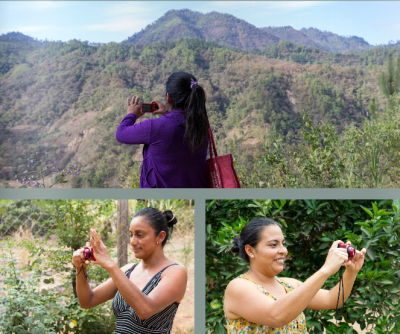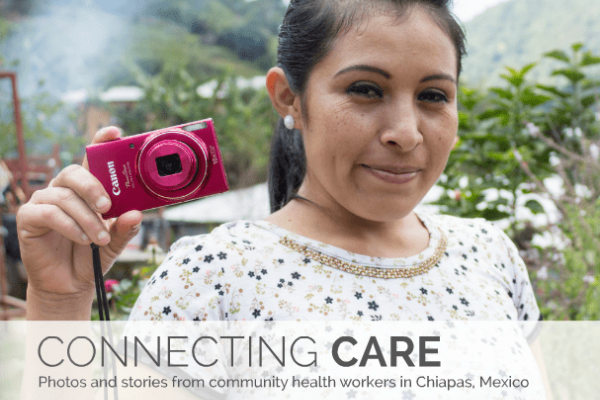In small and remote mountain villages in the Mexican state of Chiapas, Community Health Workers (CHW), referred to here as acompañantes, regularly visit their chronically ill neighbours to provide both medical and emotional support. When people are geographically and sometimes socially isolated and affected by ill health, CHWs provide vital care and social connection.
An initiative of a Partners in Health Canada sister organization called Compañeros en Salud (CES), SocialConnectedness.org featured this unique programme back in March. In partnership with the Samuel Family Foundation, CES has organized a digital collection of photos and stories that document the work of twelve acompañantes, while emphasizing the important role they each play in fostering social connectedness in their communities.
The CHWs were given compact cameras in order to capture their everyday activities for the Connecting Care project. This was a new experience for many of the acompañantes. As one expressed, “we had never held a camera in our hands before.” The acompañantes documented their duties and responsibilities, which include not only providing medication to the physically and mentally ill, but also providing advice, counselling and socialization opportunities. The project displays images of some of the patients involved – both young and old, able-bodied and with disabilities – and reveals how their health circumstances and social environment can produce the conditions for social isolation.
Yadiro Roblero talks about her work as a caretaker of a woman in a wheelchair, who can no longer visit with others in the village because of her lack of mobility. “When I visit her, she is happy,” Roblero explains. Mariela Diaz shares her story of caring for a blind man, who, upon the loss of his sight, was suicidal. Diaz shares that with treatment and care, the man’s depression has subsided. This makes Diaz happy because “if we had not talked with him, he would have taken his own life.”
Eudeli Velazquez cares for a schizophrenic man who was locked in a tiny room since his early twenties. CES helped him to receive a diagnosis and educated his family and other community members about his condition. Velazquez is proud that through her continued work with him and by providing mental health education to the community, the man has been reintegrated into society. The villagers are no longer afraid of him and he can be free to enjoy his life. “More than anything,” Velazquez says, “I’m glad I can be useful for him.”
It’s now always easy to establish connection and trust in the community. Politics and religion can sometimes split a community in cases where people support different political parties or attend different churches. Those that are more religious do not celebrate occasions by dancing, and often remove themselves from political gatherings. The CHWs document these divisions to highlight some of the ongoing isolation issues in their communities – an extra obstacle for them to overcome as they search for common ground with their patients.

Women at CES
The CHWs not only document their patients’ stories for the Connecting Care project, they document their own lives as well. They share stories of community development and social connection: building of new roads; coming together in food preparation; working as a team to tidy and maintain the local park; and tending to the coffee plants. They take photos of their children, their husbands, and their uncles to show “the ones we love.” They even document their pets. A photo of CHW Guadalupe Lopez’s pig is accompanied by the explanation: “He makes me laugh a lot, and that’s why I chose to photograph him.”
This Connecting Care project is truly a wonderful, real-world example of a project that aims to strengthen social connectedness in isolated communities. Compañeros en Salud, Partners In Health Canada and The Samuel Family Foundation have all recognized a unique challenge in this remote village, and have worked to give the acompañantes and their patients a platform to share their success stories, while emphasizing the important role that Community Health Workers can play in building resilient communities around the world.
To view the Connecting Care project online, visit
https://issuu.com/companerosensalud/docs/english_digital, or http://issuu.com/companerosensalud/docs/spanish_digital for the Spanish version.___________________
This story originally appeared on socialconnectedness.org

